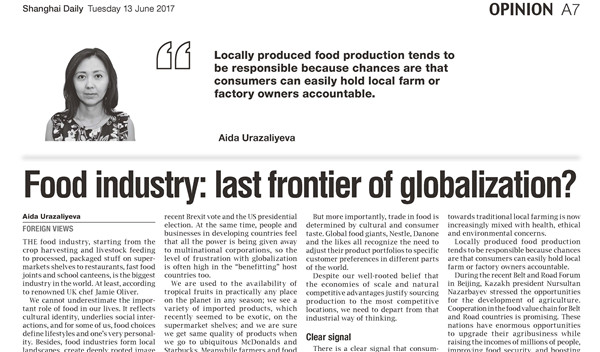Author: Release date:2017-06-27 15:38:01Source:发展研究院英文

THE food industry, starting from the crop harvesting and livestock feeding to processed, packaged stuff on supermarkets shelves to restaurants, fast food joints and school canteens, is the biggest industry in the world. At least, according to renowned UK chef Jamie Oliver.
We cannot underestimate the important role of food in our lives. It reflects cultural identity, underlies social interactions, and for some of us, food choices define lifestyles and one’s very personality. Besides, food industries form local landscapes, create deeply rooted image and connection with a certain way of living (think of French rural scenery, Swiss fields with beautiful cows grazing there and the country’s famous cheese, agricultural tourism in Italy, Texan ranches, the list can go on and on), thus agribusiness shapes ecosystems in many ways.
In today’s globalized world, it seems that only efficiency and cost drive where and how something will be produced. Manufacturing and services move to competitive locations.
Outsourcing these jobs created strong anti-globalization sentiment in developed nations, which probably reached its peak in 2016 with landmark events such as the recent Brexit vote and the US presidential election. At the same time, people and businesses in developing countries feel that all the power is being given away to multinational corporations, so the level of frustration with globalization is often high in the “benefitting” host countries too.
We are used to the availability of tropical fruits in practically any place on the planet in any season; we see a variety of imported products, which recently seemed to be exotic, on the supermarket shelves; and we are sure we get same quality of products when we go to ubiquitous McDonalds and Starbucks. Meanwhile farmers and food producers in Kazakhstan, for instance, discuss competition with Brazil.
Argentina supplies wheat to the Middle East; China and the USA are discussing removing barriers to trade in beef. Yet, when it comes to food industry, it might be less global than we imagine.
If we look at the geography of trade in agricultural commodities and processed food, it is more regional than global.
China tends to trade with Asia and Oceania, Russia with Europe and Central Asia, while the Americas trade among themselves and Europe. This regional bias is partially explained by the existence of regional and bilateral trade agreements.
But more importantly, trade in food is determined by cultural and consumer taste. Global food giants, Nestle, Danone and the likes all recognize the need to adjust their product portfolios to specific customer preferences in different parts of the world.
Despite our well-rooted belief that the economies of scale and natural competitive advantages justify sourcing production to the most competitive locations, we need to depart from that industrial way of thinking.
Clear signal
There is a clear signal that consumers prefer their food to be organic, local and artisan — a market worth US$50 billion in the US alone — socially responsible and produced in environmentally friendly way. And Asian countries need to design agricultural policies with a consideration for the large part of their poor population residing in rural areas.
Of course, there is a clear convergence in the trend in people’s food choices with income growth and increasing penetration of national cuisines as no country today exists in isolation.
But there is a natural attachment to locally sourced food, which looks and tastes familiar, and the sentiment towards traditional local farming is now increasingly mixed with health, ethical and environmental concerns.
Locally produced food production tends to be responsible because chances are that consumers can easily hold local farm or factory owners accountable.
During the recent Belt and Road Forum in Beijing, Kazakh president Nursultan Nazarbayev stressed the opportunities for the development of agriculture. Cooperation in the food value chain for Belt and Road countries is promising. These nations have enormous opportunities to upgrade their agribusiness while raising the incomes of millions of people, improving food security, and boosting regional (or even global) trade.
But, the devil is in detail.
And it is important to tackle these opportunities and design policies in a way that benefits local farmers and meets demand for socially, environmentally and culturally sensitive agricultural and food processing practices.
Otherwise, we may get a positive and final answer to the lately popular question: “is globalization in retreat?”
Aida Urazaliyeva, visiting scholar at Fudan Development Institute, senior researcher at National Analytical Center, Nazarbayev University, Kazakhstan.
For PDF version: Aida Urazaliyeva 上海日报2017.6.13.pdf
Aida Urazaliyeva 上海日报2017.6.13.pdf
Information about Fudan Development Institute Visiting Scholar Program
http://fddi.fudan.edu.cn/dongtai/tongzhigonggao/4797.html